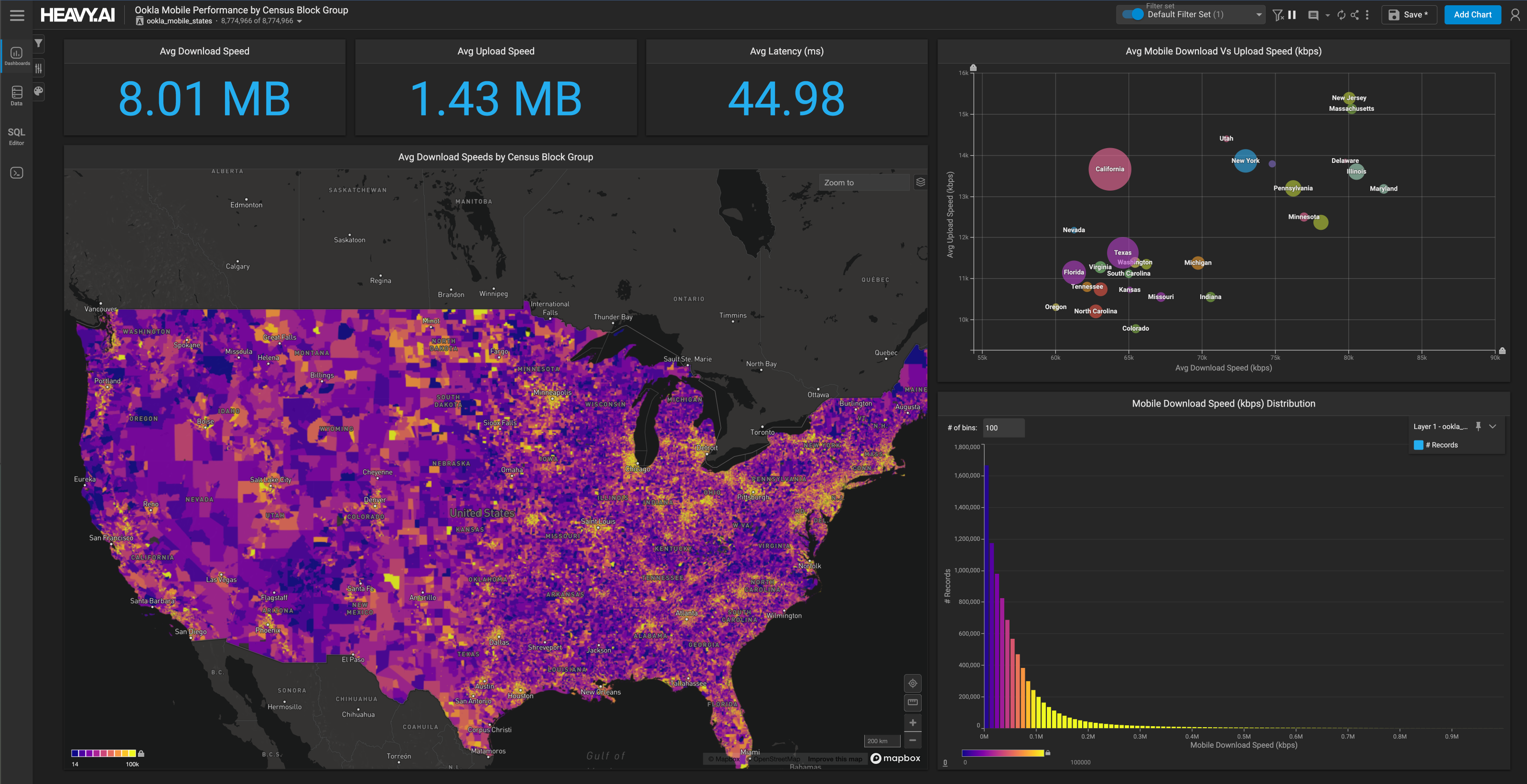
OmniSci Hacks the Weekend
Download HEAVY.AI Free, a full-featured version available for use at no cost.
GET FREE LICENSEOn the weekend of February 15-17th, the OmniSci Community group split into two teams and attended two different hackathons: HackDFW in Dallas and HackCWRU in Cleveland.
So, what exactly is a hackathon and what value does it bring to companies who participate?
Think of a hackathon as an event where individuals of all backgrounds (usually technical) come together and form teams around a problem or idea. Standard hackathons give attendees 24-36 hours to build an end-to-end project—which could be an application, website, or a hardware-based creation. Skill levels vary, with the beauty of hackathons being that they’re meant to be inclusive, providing a venue for sharing of information and learning. Some “hackers” sleep for a few hours and some barely at all. Within this intensive time crunch, teams come up with incredibly creative and colorful solutions for the provided challenges.
The value for companies sponsoring and participating in these types of events presents itself in many ways.
- Exposes your company’s brand to the next wave of technologists. Get early adoption to your platform. Think about it, when will you ever have the opportunity to have 100+ users try out your platform and test its limits all at the same time? That being said, your product should have the capabilities and bandwidth to support a wide variety of users.
- Traditional resumes can only show you so much. Finding the right talent takes time, especially through the typical submission portal and interview process. Seeing what a potential candidate can come up with in 36 hours is much more impressive and demonstrates their capabilities regarding creativity, execution, and technical depth.
- Students are more forgiving than customers. Create early tool adopters and receive feedback on user navigation and potential bugs. It’s refreshing to see how frank and forward-thinking students can be.
- You never know who you’ll meet. You might find your next new hire, a great collaborator, or a long-lasting friend. The hackathon community is strong and runs internationally —many are retired champion hackers who return as organizers, mentors, and volunteers, looking for ways to give back.


The challenge OmniSci presented at each hackathon consisted of two segments.
The first segment was to create a custom application (mobile or web app) that visualized a key finding based on the datasets provided to the participants. Dallas HackDFW participants were given Uber data along with San Francisco traffic zones, while Cleveland HackCWRU participants were given NFL data (read more about it here). The second segment of the challenge was to integrate their application with OmniSci, making the data from the hackathon visual and interactive.
We were impressed with the 30+ submissions we received—a few applied their hacks to real world issues, some physically built a mini library as a prop for their project, and others relentlessly looked for relevant open source datasets.
That being said, OmniSci is proud to announce the winning teams from both HackCWRU and HackDFW.
HackCWRU Winners
Salary Samurai
Nathan Dimmer (Clarkston Senior High School) and Andrew Dimmer (Oakland University)


Salary Samurai is a data analytics tool that utilizes US Census data from 47 states, totaling over 10.6 million data points. This tool produces easy to read, powerful insights into future possibilities. It allows users to look at and compare college degrees, and their financial impacts, such as the amount of debt accumulated upon graduation, the average pay right out of college and later in life. It shows all of this data through interactive charts and graphs, which work together to illustrate the impact that your college and career choices have on the rest of your life. Try it here: https://salarysamurai.com/
California Vaccination Trends
Neha Gupta and Adam Zhang (Solon High School)


Inspired by the measles resurgence in Washington State, these hackers created a project that would show trends in vaccination exemption. Largely influenced by this and the all-important herd immunity, they believe it’s vital that government officials and those at CDC are aware of areas with vulnerable populations. They first found a collection of California data on vaccine adherence and exemption, with insights into specific illnesses. Google Maps API was used to find the longitude and latitude of each school location in the vulnerable areas. They used OmniSci to translate and create visual representations in order to discern potential trends.
HackDFW Winners
home-Unity
Tristan McDaniel, Kedar Raman, Venkata Ravila, Arjun Ramesh, and Yash Parakh (University of Texas at Austin)

home-Unity utilizes the OmniSci Immerse platform to provide the City of Dallas with visualizations regarding homelessness in Dallas. home-Unity created a mobile application for the cell phones of homeless individuals that enables them to report incidents to the City of Dallas and anonymously report their location for the City to analyze. This information enables the City of Dallas to enhance policy-making to benefit the homeless by providing the City with real-time information regarding their whereabouts.
For example, there’s a map visualizing live crime reports from the application’s users, which enables the City to alert those that are close to the crime about the incident. Additionally, there’s a map containing information regarding the homeless population and open shelters in the area, through which the City can determine optimal areas for new shelters. By giving the City the ability to track their location, without having to reveal their identities, this application allows the City of Dallas to both interact and collect valuable insights that can be used to shape policies that affect the impoverished. See more here.
Hail or Drive
Saras Paudel (Sam Houston State University), Bigyan Subedi, Ayush Srivastava, and Dhruv Sandesara (University of Texas at Austin


Hail Or Drive is an application that helps users decide if they should drive or rideshare to a certain destination within the city. It allows the user to order Uber or Lyft, but also helps uncover the hidden costs of driving such as time and parking fees. Using Omnisci's interactive data visualization and analytic tools, this team was able to find trends amongst Uber Movement data that enables riders to suggest optimal times for travel. Availability and pricing of parking garages were also provided near the end destination so that users could make the most cost and time effective decisions.



Sponsoring two hackathons on the same weekend was no easy feat, but it was incredibly rewarding—so the OmniSci Community team won’t stop there.
OmniSci will be sponsoring at these upcoming hackathons:
HackSC Los Angeles
April 12-14, 2019
UCSD DS3 Datathon
April 20, 2019
Students can use OmniSci Cloud for free if they use their school associated email for non-commercial use. Email community@omnisci.com for future collaborations, event engagements, or just to show us what you’re working on.
Interested in trying OmniSci? Start here: https://www.omnisci.com/cloud




